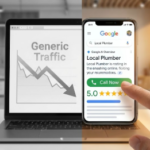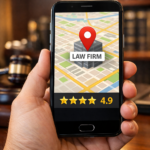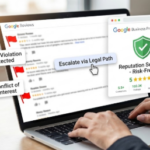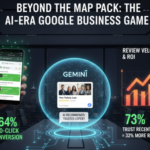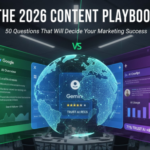How Can Small Businesses Rank with Google AI? 📈
You’ve seen it. That new, shaded box at the top of Google that just gives you the answer. It’s called an AI Overview, and if you’re a small business owner, it probably sent a jolt of panic right through you. I’ve heard it from dozens of my clients over the past few months:
“Is my website about to become invisible?”“If Google just answers the question, why would anyone ever click on my site?”“Is SEO dead?”
Let me start by saying this, based on over a decade of helping small businesses navigate every twist and turn Google has thrown at us: Take a deep breath. SEO is not dead. But the rules of the game have fundamentally changed.
For years, the game was about keywords and backlinks. It was about convincing Google’s algorithm that your page was the most relevant result. Now, the game is about proving to Google’s AI that your business is the most authentic, trustworthy, and experienced answer in the real world.
The shift is huge. In fact, some industry estimates project that AI-driven search could handle up to 25% of all search queries by 2026. This isn’t a fad; it’s the new reality. But here’s the secret: this new reality is a massive opportunity for legitimate, hard-working small businesses. It’s a chance to leapfrog the low-quality competitors and content farms. You just need to know the new playbook.
This guide is that playbook.

What is Google’s New “Human Detector,” E-E-A-T?
To understand how to win, you first need to understand Google’s new obsession. It’s an acronym called E-E-A-T, and it’s the single most important concept in marketing today. In their own official documentation, makes it clear that this is at the heart of how they rank content.
E-E-A-T is basically Google’s algorithm for finding real-world experts. It stands for:
- Experience: Do you have real, first-hand, lived-it experience with what you’re talking about?
- Expertise: Do you have advanced knowledge or skills in your field?
- Authoritativeness: Are you a known, respected source in your industry or local community?
- Trustworthiness: Are you reliable, honest, and can people count on your business?
An AI can’t fake these things. It can write an article about fixing a leaky pipe, but it has never actually held a wrench. It has no Experience. It can summarize what other websites say, but it has no true Expertise. It has no real-world reputation, so it has no Authoritativeness. And it has no customer reviews, so it has no Trustworthiness.
Your job is no longer to just optimize a webpage. Your job is to prove your E-E-A-T across the entire internet. Here’s your 5-point survival guide to do exactly that.
Survival Point #1: Prove Your First-Hand Experience
The first “E” in E-E-A-T is the newest and, I believe, the most powerful for small businesses. AI can scrape information, but it can’t create new, lived experiences. This is your secret weapon!
Generic content is dead. The era of writing a 500-word blog post on “The Benefits of Landscaping” is over. An AI can do that in ten seconds. To win, you have to create content that only you could have created.
Your Action Plan:
- Create “We Solved This” Case Studies: Don’t just talk about what you do. Show it. Take a real customer problem (with their permission, of course) and walk through how you solved it.
- Before: “Here was the overgrown, chaotic backyard we started with in Camp Hill.” (Include a real photo!)
- The Process: “Our first step was to address the drainage issue…”
- After: “Here is the final result: a beautiful, functional outdoor space the family can enjoy.” (Include a stunning “after” photo and maybe a client testimonial).
- Write with “I” and “We”: Infuse your content with your personal and company voice. Instead of “It is important to check for leaks,” write “The first thing we always check for is a hidden leak behind the wall. I’ve seen this cause thousands in damage…” This is a powerful signal of first-hand experience.
- Use Unique, Real-World Data: Did you poll your customers? Did you notice a trend in the service calls you’re getting this season? Share that! “This spring, 70% of our HVAC calls in the Harrisburg area have been about one specific issue…” This is unique data that an AI cannot replicate.
An AI can tell people what you do. Only you can show them how you do it and the real results you get. This is the foundation of building an experience-rich website.
Survival Point #2: Showcase Your Expertise with Multimedia
The second letter, “E” for Expertise, is about proving you’re a master of your craft. And in 2025, the most powerful way to do that is not with more text, but with multimedia.
Think about it. An AI can write a flawless article. But can it…
- Host a webinar explaining a complex topic?
- Record a short video demonstrating a product?
- Appear on a podcast as a guest expert?
- Create a compelling infographic from its own data?
No. These are uniquely human ways of demonstrating deep knowledge. Video, in particular, is becoming a critical ranking factor for AI search. Why? Because a video of a real person confidently explaining a topic is a massive signal of authenticity and expertise. A recent HubSpot report on marketing trends found that 87% of marketers say video has helped them increase website traffic. Google knows this, and its AI is actively featuring videos in its new overview answers.
Your Action Plan:
- Start a Simple “How-To” Video Series: Take the most common questions you get from customers and answer them on camera. Use your smartphone! A 2-minute video on “How to Spot a Termite Swarm” from a pest control expert is infinitely more valuable than a generic article.
- Create Video Walkthroughs: If you’re a realtor, do a video tour of a neighborhood. If you’re a consultant, do a screen recording where you explain a concept on a digital whiteboard.
- Embed Videos in Your Blog Posts: Don’t just post videos on YouTube. Embed them in relevant blog posts on your website. This creates a rich, multi-format page that both humans and Google’s AI will love.
How We Help: I know what you’re thinking. “Linda, I don’t have time to be a YouTuber!” This is the number one hurdle for small businesses. That’s precisely why we developed our Video Marketing Programs. We’ve created a “done-for-you” system where we handle the strategy, scripting ideas, professional editing, and SEO optimization. You just spend a few minutes sharing your expertise on camera, and we turn it into a powerful, lead-generating asset. We make it effortless to showcase your expertise.
Survival Point #3: Build Real-World Authority
Authoritativeness is about your reputation in your industry and community. It asks: Are you a go-to source? Do other respected people or organizations look to you for your opinion?
In the past, this was mostly about getting backlinks from other websites. That’s still important, but AI is getting smarter. It’s starting to understand real-world authority signals.
Your Action Plan:
- Focus on Local PR: Get mentioned in your local media.
- Sponsor a local Little League team.
- Speak at a Chamber of Commerce event in your town.
- Offer comments to local news reporters on a story related to your industry.
- Get featured on a local blogger’s “best of” list.
- Become a Guest on Industry Podcasts: Find podcasts that your ideal customers listen to and pitch yourself as a guest expert. A single podcast appearance can generate more authority than ten blog posts.
- Build Your Professional Bio: Make sure your website has a detailed “About Us” page with a professional bio for you and your key team members. Include awards, certifications, and years of experience. Your bio is a direct signal of your authority.
AI is trying to connect the dots. It wants to see that your business name doesn’t just exist on your own website, but is mentioned in other trusted places online and in your community.
Survival Point #4: Solidify Your Trust with Social Proof
This is the big one. Trustworthiness is the final, and perhaps most important, letter in E-E-A-T. Google’s AI needs to know that it can trust you before it recommends you to its users.
And how does it measure trust? Primarily through what other people say about you.
Your customer reviews are no longer just for Yelp or your website. They are now a primary ranking factor that Google’s AI is using to evaluate the trustworthiness of your entire business. A steady stream of recent, positive reviews is a massive signal of trust. A lack of reviews, or a handful of negative ones, is a giant red flag.
Your Action Plan:
- Make Your Google Business Profile a Fortress: Your GBP is the epicenter of local trust. It must be perfectly optimized, but more importantly, it needs reviews.
- Implement a Proactive Review Generation System: You cannot be passive about this. You must have a simple, repeatable process for asking every happy customer to leave a review.
- Respond to EVERY Review: This is non-negotiable. Responding to positive reviews shows you appreciate your customers. Responding professionally to negative reviews shows you are accountable and care about customer service. In fact, a BrightLocal consumer survey found that 88% of consumers are likely to use a business that responds to all of its reviews. It’s a huge trust builder.
How We Help: Building a 5-star reputation takes consistent effort. Our Reputation Management and Review Builder programs are designed to do this for you. We help you create an automated system to generate more positive reviews from your best customers and can manage your review responses, turning your social proof into a powerful asset that both customers and Google’s AI will trust.
Survival Point #5: Structure Your Data for AI
This last point is a little more technical, but the concept is simple. You need to make it incredibly easy for Google’s AI to understand what your website is about. You do this with something called Schema markup.
Think of it like a nutrition label for your website. A nutrition label clearly lists the calories, fat, and protein in a standardized format that’s easy to read. Schema markup does the same for your business information. It “labels” your address, phone number, hours, services, and reviews in a standardized code.
When Google’s AI sees this code, it doesn’t have to guess. It instantly knows:
- “This is a local business.”
- “This is its address.”
- “This is its star rating.”
- “This is a list of its services.”
Your Action Plan:
- Perform a Schema Audit: Use Google’s “Rich Results Test” tool to see what structured data is currently on your site.
- Implement Key Schemas: At a minimum, every local business should have “LocalBusiness” schema and “Review” schema on their website.
- Talk to a Professional: This is one area where it’s often best to have an expert help. A small mistake in the code can cause problems.
How We Help: Implementing structured data is a core part of all our Marketing Packages. We ensure your website is technically sound and speaks the language that Google’s AI understands, giving you a critical advantage over competitors who have neglected this step.
Be More Human
The age of AI search can feel intimidating. But the path forward is surprisingly simple.
Stop trying to trick an algorithm. Start focusing on proving you are a real, experienced, and trustworthy expert. Create content that an AI could never fake. Showcase your expertise on video. Build your authority in your local community. And cherish your customer reviews like the gold that they are.
The future of SEO isn’t about being more robotic. It’s about being more human. And that’s a game that authentic small businesses are perfectly positioned to win.
Key Takeaways
- AI is Changing the Game, Not Ending It: The goal is no longer to be a top link, but to be the trusted, authoritative answer featured in AI Overviews.
- Master E-E-A-T: Focus your marketing on proving your real-world Experience, Expertise, Authoritativeness, and Trustworthiness.
- Create What AI Can’t: Prioritize first-person case studies, unique data, and especially video content to showcase your uniquely human expertise.
- Your Reputation is a Ranking Factor: A steady stream of recent, positive customer reviews is one of the most powerful trust signals for Google’s AI.
- Local SEO is More Important Than Ever: A perfectly optimized Google Business Profile is your direct resume for getting featured in local AI-powered search results.
Common Questions About Ranking in the Age of AI
- Will my website traffic go down because of AI Overviews? It might, and this is why your strategy needs to shift. Some informational traffic may decrease because users get their answer directly from Google. However, by focusing on the strategies above, your goal is to be the source cited in that AI answer, which builds authority. More importantly, for local businesses, the goal is to have your Google Business Profile (with your phone number and address) be the featured result, leading to phone calls and visits that don’t require a website click at all.
- How do I choose what topics to make videos about? Start with your customers! What are the top 5-10 questions you get on the phone every single week? Each one of those is a perfect topic for a 2-minute video. Answering these common questions on video not only provides great content but also saves you time and positions you as a helpful expert.
- This E-E-A-T stuff sounds like a lot of work. How much time does it really take? Building a strong, authentic brand does take consistent effort, which is a major challenge for busy owners. That’s why we’ve built our programs to do the heavy lifting. For example, our Video Marketing program can turn a 20-minute conversation with you into a month’s worth of content. The key isn’t to spend more time, but to have a smart, efficient system in place.
- What is the single most important thing I can do for my local search ranking right now? Go to your Google Business Profile. Right now. Respond to your last five reviews (both positive and negative). Then, upload five new, high-quality photos of your work, your team, or your location. Finally, create a “Google Post” about a current offer or recent project. This burst of activity is a powerful, immediate signal to Google that your business is active and engaged.
- Is it better to focus on my website or my social media profiles? It’s not an either/or question anymore. Google’s AI looks at your entire digital footprint to verify your E-E-A-T. Your website is your home base, your social media profiles prove you’re an active business, and your Google Business Profile is your local storefront. They all need to be consistent and work together to tell the same story: that you are the best, most trustworthy choice for the customer.
GBP LInk – https://g.co/kgs/GR8yH4a
LinkedIn – https://www.linkedin.com/company/business-solutions-marketing-group-llc/?viewAsMember=true
Instagram – https://www.instagram.com/business_solutions_mg/
Twitter – https://x.com/BSMGLLC
Facebook – https://www.facebook.com/BusinessSolutionsMarketingGroup
BlueSky: https://bsky.app/profile/bussolutions.bsky.social
TikTok – https://www.tiktok.com/@linda_donnelly
YouTube – https://www.youtube.com/channel/UC4w357-txvxOaHff2hTfSSg


